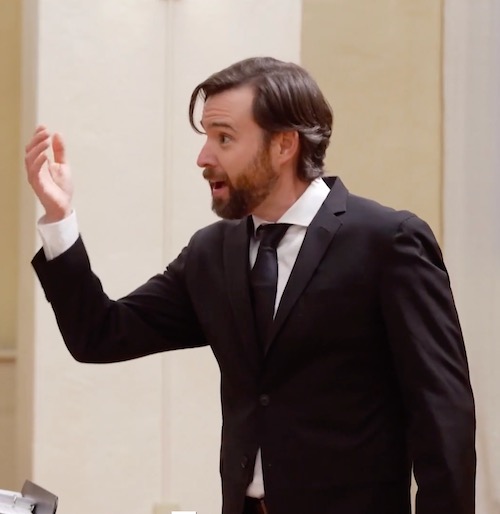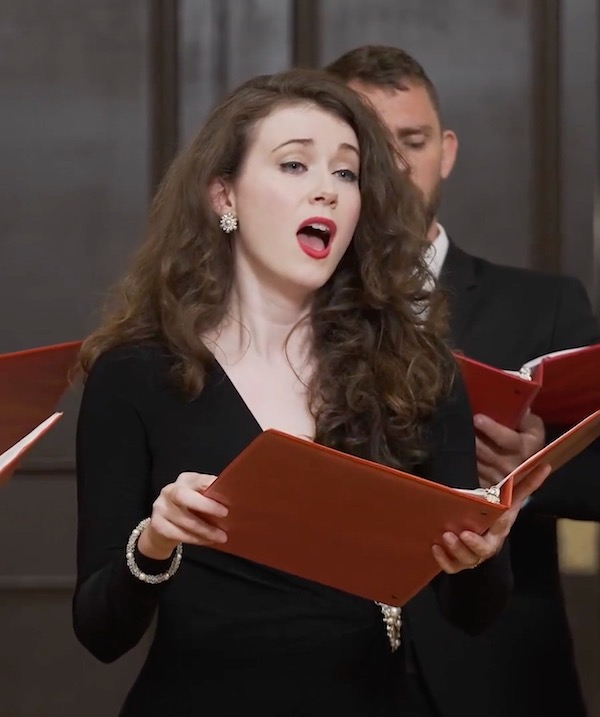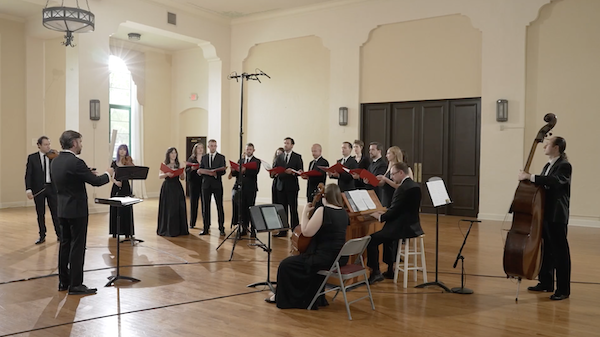Mozart, Monteverdi wrap Seraphic Fire’s pandemic season on hopeful note

The music of Monteverdi and Mozart, two of the greatest vocal composers, concluded Seraphic Fire’s season of streamed concerts on Sunday afternoon.
This program was crucially different from former performances. While previous offerings were taped by the artists individually and, then, assembled through the miracle of modern technology, this program found the choir performing together for the first time in fourteen months. The performances were filmed at Comber Hall in Coral Gables’ Church of the Little Flower. The smiles on the faces of the singers and artistic director Patrick Quigley radiated their joy at working together again. That also came through powerfully in the thrilling sound of their vocalism. In no small manner, the presentation represented the road back to live performance next fall.
Monteverdi’s Selva morale e spirituale represents the work of a mature choral master. (Monteverdi was in his seventies when he composed these motets.) Two large-scale choral settings bookend a series of more intimate duos and trios.
From the first bars of the “Beatus vir,” Monteverdi’s gift for inspired melodies is immediately evident. Quigley divided the instrumental component on opposite sides of the choir with two violins on the left and bass continuo (organ, cello, bass) on the right. His skill at balance and coordination of instrumentalists and vocalists remains unabated and the choral singing was unified and highly disciplined.
It was a pleasure to hear Patrick Muehleise’s high tenor, James K. Bass’s warm bass and Steven Eddy’s resonant sonority in the “Deus tuorum militum.” The blending of timbres was well-nigh perfect in music rollicking and reverent.

Nola Richardson’s exquisite singing in Seraphic Fire’s performance of Bach’s St. Matthew Passion and the Master Chorale’s presentation of Haydn’s Creation in 2019 marked her as one of the finest vocalists regularly performing in South Florida. Her flexibility and radiant timbre made “Iste confessor” a highlight of the program. Her duo partner Chelsea Helm was no less impressive, displaying agility and total security above the staff. The concluding “Dixit Dominus” finds Monteverdi’s musical voice reaching the sublime. Quigley splendidly coordinated the solo octet and ensemble forces. The chorus gave deep intensity of expression to this vibrant finale while maintaining total accuracy of intonation and execution.
Mozart’s Missa brevis, K. 192 is the work of an 18-year-old composer whose genius is already striking in the melodic fluency and mastery of vocal and instrumental writing. For all his outstanding talents as a choral conductor, Quigley is also a patrician musical stylist. Under his direction, Renaissance, Baroque, classical and contemporary accents emerge sharply defined. The chiseled classicism and crisp articulation in the opening pages of the mass were idiomatic and the vital solo quartet’s role was ably traversed by some of the choir’s standout vocalists. Amanda Crider’s burnished mezzo beautifully complemented Richardson’s florid timbre. James Reese’s fine lyric tenor contrasted nicely with the suave bass of John Buffet. Contrapuntal lines in the “Sanctus” were transparent and clean, the corporate ensemble at top strength. The plaintive melody of the “Agnus dei” finds Mozart in operatic territory. The ensemble’s terraced dynamics and Quigley’s impressive control fully realized this worthy revival of an early minor masterpiece by one of the giants of music history.
Between the “Gloria” and “Credo” of the Missa brevis, Quigley inserted a performance of Mozart’s Sonata da chiesea in F, K. 224 which gave the instrumentalists an opportunity to take the spotlight. The vigorous bowing of violinists Edson Scheid de Andrade and Katherine Hyun set the pace. Here and throughout the concert, cellist Sarah Stone, bassist Nathaniel Chase and organist Justin Blackell provided stalwart continuo support. The brief sonata proved an enlivening interlude.
Concluding the program with “Ave verum corpus,” K. 618 brought the concert to Mozart’s tragic final year of 1791. In just over two minutes of music, Mozart created one of his most angelic inspirations. Far from sadness, this serene outpouring commands hope. With Quigley’s spacious pacing and the choir’s restrained, yet beautiful rendition, the path forward for one of South Florida’s finest musical organizations resounded affirmatively indeed.
Seraphic Fire’s 2021-2022 season opens November 4-7 with performances of Pergolesi’s Stabat Mater in Miami, Coral Gables, Fort Lauderdale and Boca Raton. seraphicfire.org

Posted in Performances
Leave a Comment
Mon May 24, 2021
at 11:37 am
No Comments